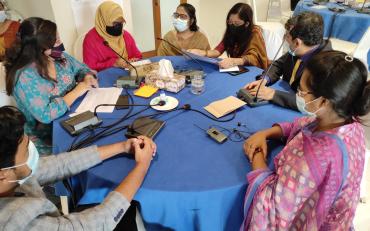On 16 and 17 March 2022, the Global Action on Disability (GLAD) Network and the International Disability Alliance (IDA), supported by the UK Foreign Commonwealth and Development Office (FCDO), held a two-day high-level workshop in Dhaka, Bangladesh, to address the barriers faced by organisations of persons with disabilities (OPDs) in accessing funding opportunities to enable their meaningful participation in development efforts.
The workshop was attended by 29 participants that included representatives of national and local OPDs, disability organisations and members of the International Disability and Development Consortium (IDDC) which is a GLAD member. Over two days, they exchanged experiences and ideas on OPD engagement in Bangladesh, learnt about existing or proposed coordination mechanisms between donors at the country level, and reflected upon current research on OPD engagement, including the OPD Engagement Paper launched at the Global Disability Summit 2022.
In particular, participants worked in groups to discuss the OPD engagement recommendations presented in the GDS discussion paper and how to strengthen them in the Bangladesh context.
The methodology developed for this workshop will be replicated in other countries, including Nepal and Kenya, to contribute to a series of country case studies and recommendations for coordinated donors’ investments, currently being produced by the GLAD Network.
The case studies and recommendations aim to ensure that OPDs have access to adequate core funding and resources to perform their operations with independence, autonomy and adequate capacity; to ensure application processes are inclusive and accessible to a broader diversity of OPDs, including smaller grassroots, youth, women-led OPDs and OPDs of other underrepresented groups; and that funding actively contributes to advancing human rights, both in development cooperation and humanitarian action.
Financial support remains the biggest challenge for OPDs to exist as representative organisations, and strongly undermines their independence, autonomy, and ability to develop their capacities and engage with others. As OPDs represent discriminated groups, they equally experience the consequences of prejudice and discrimination, resulting in lower levels of education, lower access to social capital and funding opportunities, and fewer invitations to participate compared to other civil society groups. Because of the number, complexity, and lack of coordination between different processes and stakeholders soliciting OPDs’ inputs, OPDs face significant opportunity costs when choosing to engage with different agencies. This, combined with limited financial resources, is experienced more harshly by underrepresented groups, stretching OPDs’ capacities to the maximum.
Moreover, the COVID-19 pandemic has brought uncertainty and budget cuts to Official Development Assistance (ODA) making it all the more important that investments made in supporting OPD capacity development are optimised, strategic and impactful.
Participants appreciated the opportunity to collectively brainstorm around the exercise and that there was a safe and constructive space in which their concerns could be articulated. They also appreciated the diversity of participants representing the different OPD networks in Bangladesh as well as those present in the different districts of Bangladesh, as well as those representing underrepresented groups of persons with disabilities such as persons with intellectual disabilities, psychosocial disabilities and the deafblind.
